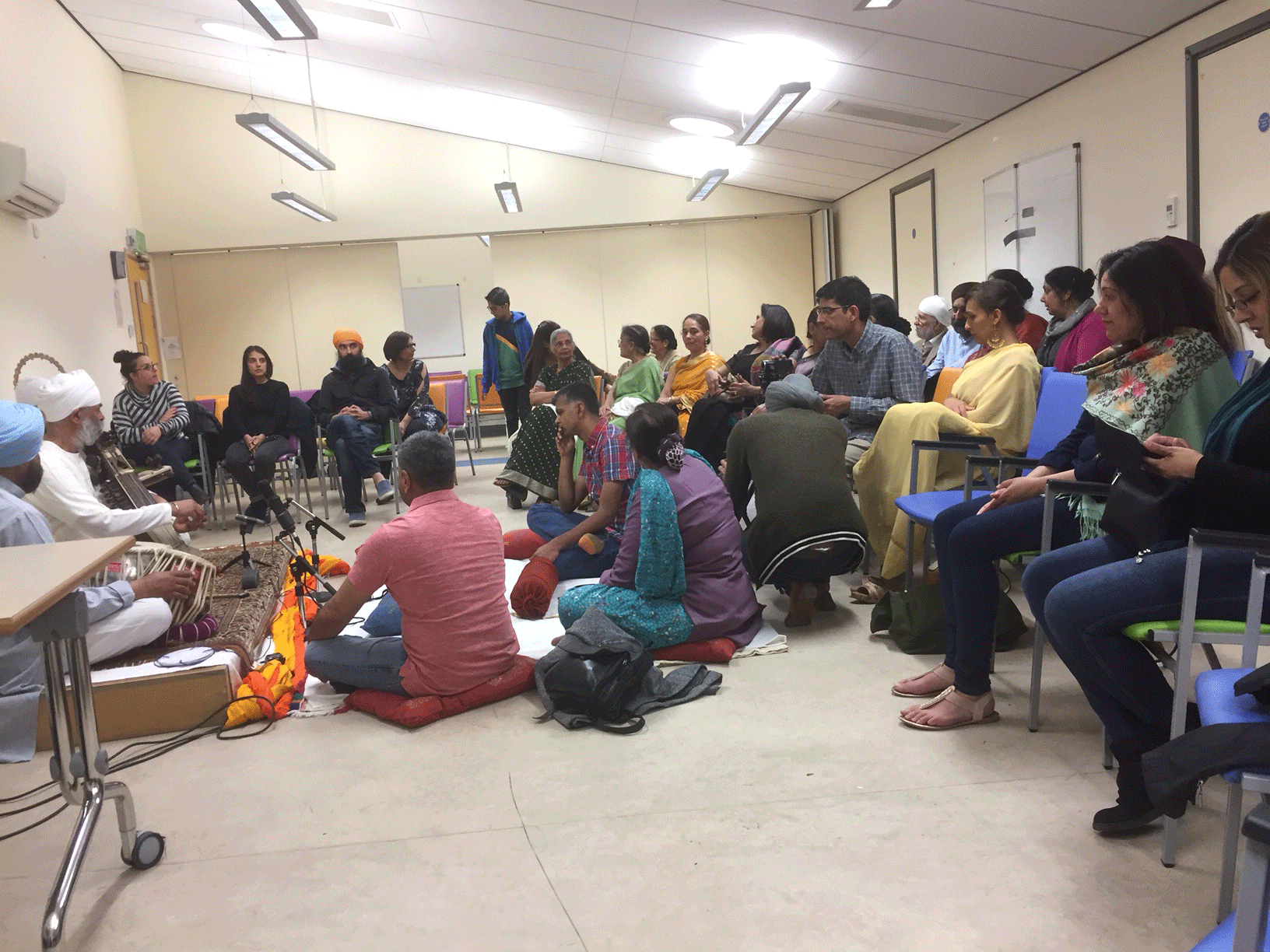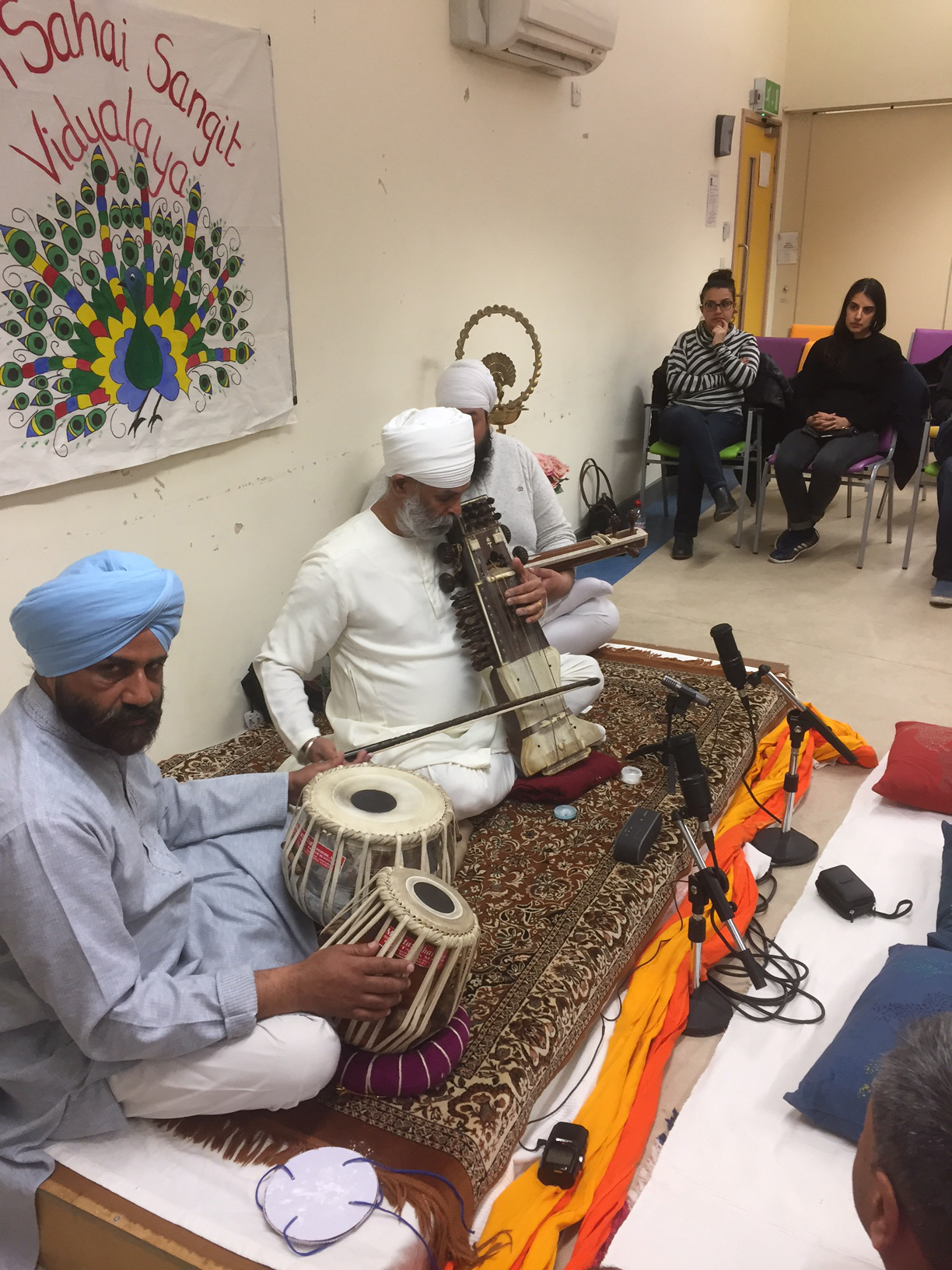A response to recital one in STRING FEST 2017, an ongoing series,
Dominion Centre, Southall, April 22nd 2017

I
If the sitar is the sound of the indian air which is scented
And the santoor, its soul chiming across the flesh and bones
Of air’s cage,
……………………………………………Then the sarangi
Is the voice of the heart, as it’s leaving
The static realm for another,
Beyond earthly words’ sounding,
Distant to all words can save.
The instrument binds the inner call
Towards yearning,
………………………………………As Surgeet Singh weaves his sound sheets
In a cream coloured room, like sung dreams;
The music softens the heart, turning the blood to dreamt rivers
Stitching those in attendance into one cojoined seam.
A poetic response is I hope a fitting one to this, the first concert in a new series of recitals and performances arranged by Jay Visvadiva of Sama Arts and Anjan Saha and Dr Frances Shepherd of PRSSV, reknowned promoters of Indian music and its teaching, whose organisations both celebrate the master players of Indian String instrumentation. By eschewing the larger concert halls and the preponderance of obvious commericialism, the String Fest 2017 project is about uniting and sharing the higher realms and practises of this music to new and established audiences. With regular appearances all over London, from The Nehru Centre in Mayfair, to the Dominion Centre in Southall, along with other venues like Rahmat Simab’s The Music Room in Preston Road, here is a chance to discover essential musical forces and experiences in settings intimate enough to lead to a profound sense of appreciation.
The recital although recorded was one undertaken without amplification, allowing the audience to come into contact with ‘a natural and organic sound’ as Jay Visvadiva described it, a rare thing when one stops to consider the style and inappropriate bombast of modern concert going and providing a sense of both purety and privilige for the audience who were able to see such artistry close up and at first hand, in all senses of the world.
Master Surgeet Singh, cradles his instrument,
Like a parent; the care and the caution
Around this precious wood, is a spell,
His hands stroke the strings as the other
Controls and soft presses;
The sound is seduced and encouraged
As if suddenly bursting forth from a well.
The Sarangi is a vertically held instrument, somewhere between a dulcimer and wide guitar neck or Chapman Stick which is bowed at its base. It produces a personal orchestra of sound,a legitimate voice that speaks of other rooms and forgotten places, delivering and returning audiences to another time in which the heart’s unsaid questions are answered. On listening one is transported, as this is a particular indian air and I was struck on watching and listening how Surgeet Singh holds this small rectangular cello like instrument like a baby whose soothing resonance he enables. Although based in London for the last 17 years Surgeet Singh has travelled and played all over the world as teacher and musician throughout his long and distinguished career. His work builds on that of his own master, Pandit Ram Narayan-ji, who was the first sarangi player to establish the instrument as solo vehicle for expression, away from its accepted place in the ensemble and orchestra. These innovations started in the 1940’s, and while one can appreciate the unique texture and aural colour that the sarangi supplies to group playing, its function and role seem to me to represent or capture a sense of spiritual beauty like no other.
As the bow slides across strings, a lover’s touch invokes wanting,
A sweet melancholy as we try to satisfy a whole life.
The sarangi sings in a wound which the master heals
With his playing; as he improvises across ragas,
His sixteen beat song removes strife.
We move from the world we know now
Into his, and into the world he was part of,
As music restores and romances
The common day husband
To more than he knows or desires,
Revealing within, evening’s wife.
We rarely transcend in the west. Recent events show that clearly, and to my way of thinking the aims of this festival among many others I’m sure, is to show how eastern music provides the sense of spiritual necessity we are currently lacking. Solo recitals like this are unique opportunities. They reveal that these players allow their chosen vessels to become keys, unlocking the barriers of ignorance and incomprehension. They encourage us to move around and beyond our accepted experiences, to refocus on what is important to us not even in the general sense, but in the given moment; the place where we find the true means and methods of reformation.
The solo instrument is featured across the festival but each indian perfomance will feature Tabla, for rhythmic and even harmonic assistance. After the rehearsed Tabla player fell ill, Tarsim Singh ably replaced him on the day and his resourcefulness and sensitivity to the given sound was remarkable. One of the many benefits of Asian and Indian communities is that they are just that;they have galleries, libraries, orchestras of people and players to call on, who, separate to the western understudy or substitute, understand the work on a primal level. A western artist requires all manner of preparation, from the classical musician’s score, the actor’s text or avoidance of cliché, to the jazzer’s experience or repertoire of approaches. One of the pleasures witnessing these players is to show how quickly their sense of communion arrives.
Surgeet Singh’s face is sharp featured but soft,
His delicate eyes scour shadows,
As his fingers search through caressing
For the proper ramifications of light.
Tarsim Singh taps and plays, allowing the path
For this searching; in the cream coloured room
Of Dominion, there is a powerful search across white.
Music as milk, making the fresh from responses,
As the audience, fed like babies, are slowly reborn
On one night. People receive through these sounds
Their own sense of fulfilment, nourished no doubt
By new parents; musicians who’s every touch brings delight.
In places like this and on occasions like this, those scared by life can reaffirm all that’s sacred. The act of listening and attendance is contribution enough for the effort made by musicians
……………………………………………Whose very aim in these hard days
Is to loosen the frequent need lost within.
What we must do is align and let this festival’s celebration
Reintroduce those who pass by so that the deepest involvement can win.
Surgeet Singh’s private soul was conjured before us.
As his hands prayed , he persuaded
And taught each enraptured heart how to sing.

II
The song now transforms as Gurdev Singh takes position,
Playing his second instrument, the Dilruba, there is an earthier sound
To his strings. Not as spiritual, this; Something more from the rock
And foundation, as if the human heart through sarangi has been
Accompanied by the skin. He plays ragas with force,
Sawing with skill across silence, grounding the room with dark flavours,
Recolouring cream with a tinge
……………………………………………Of the spices of home,
As we move into another sound just as sacred,
But with one who speaks without yearning of the suffering song
Pain begins. The audience become snared by this particular power.
As Surgeet Singh had enchanted, Gurdev Singh challenges.
Tarsim Singh calls the time, as he is instructed while playing,
On which shape and pattern the raga’s affect manages.
This trio of Singh’s have sung their own magic; a spectacular invocation,
A choir representing distant times, other realms.
In a suburban room in Southall, the soul’s company is created.
With the cream of the room and the mixture with which the saintly
Restore the fallen ones back to health.
III
Concerts of this sort are often food for the spirit.
It seems to me that this String Fest is one to wear with pride and warm all.
Step away from your world to rediscover new choices.
There are other sounds to command us.
New voices, too. Hear their call.
David Erdos, 24th April 2017
